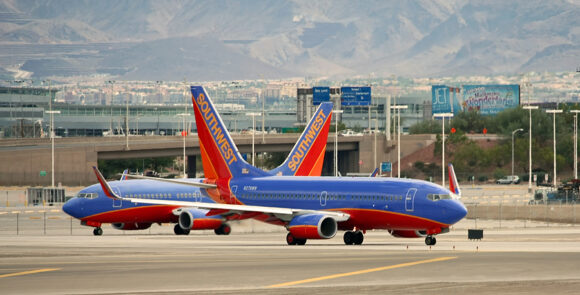Citing a concern over “opening the floodgates” to litigation, a federal judge has dismissed a flight attendant’s negligence lawsuit against her employer, Southwest Airlines, which she blamed for her husband’s death from Covid-19.
The flight attendant, Carol Madden, claimed that she and others were exposed to COVID-19 “as a result of Southwest’s failure to exercise a standard of care to prevent transmission of the virus” during mandatory safety training on July 13, 2020.
Soon after the training, she tested positive for the virus and then her husband did also. He later died on Aug. 12 from the virus at age 73. Madden brought a wrongful death suit against Southwest.
A U.S. district court judge in Maryland has now granted Southwest Airlines’ motion to dismiss the suit.
Although there were multiple factors that favored a finding of duty by Southwest, there was ultimately no finding of a duty in this case. Judge Stephanie A. Gallagher in her opinion granting the airline’s motion to dismiss the case found that Maryland courts have to balance the factors in favor of finding a duty against the fear of “opening the floodgates” to third- party plaintiffs, particularly in cases covering spousal relationships.
“Cumulatively, Maryland’s third-party duty case law and its emphasis on limiting the class of prospective future plaintiffs heavily informs the Court’s balancing,” the judge wrote. “In fact, it is the dispositive weight on the scale in favor of finding ‘no duty’ here, despite the fact that the narrow majority of factors, including foreseeability, favor imposition of a duty. Maryland courts have made their priorities with regard to third-party duties clear, and the prospect of an unstemmed and ill-defined tide of third-party plaintiffs bringing suit predominates the duty analysis.”
The judge agreed that it was reasonable to expect that ensuring flight attendants’ safety would be a “natural corollary of Southwest’s promise to protect its customers,” however she said the “broader societal consequences” of imposing that duty are harder to justify. “Such a duty would significantly expand the field of potential liability,” the judge wrote.
Madden alleged that during the training Southwest “failed to implement reasonable safety and health protocols” to prevent the participating flight attendants from contracting or spreading COVID-19. She alleged the failings included not screening flight attendants or instructors in the training session for COVD-19, not enforcing mask policies that would have lessened transmission, not implementing safe distancing requirements, not sanitizing equipment in shared and common use, and not implementing contact tracing after learning of employees’ exposure.
The case recalls an earlier lawsuit seeking to hold an employer responsible for a worker’s spouse getting sick with Covid-19.
In February, U.S. District Judge Maxine M. Chesney in San Francisco dismissed what was considered the first-of-its-kind lawsuit.
In the California case, the judge ruled that most of the claims in the lawsuit are barred due to the “exclusive remedy” provisions of workers’ compensation, under which the husband is precluded from suing his company directly. Chesney also ruled that the couple’s suit did not meet the required threshold, or standing, to hold the employer liable for creating a public nuisance.
Was this article valuable?
Here are more articles you may enjoy.


 NYC Travel Snarled by Snow as Central Park Gets 15 Inches
NYC Travel Snarled by Snow as Central Park Gets 15 Inches  Stellantis Weighs Using China EV Tech for Affordable Cars
Stellantis Weighs Using China EV Tech for Affordable Cars  Claims Handling Breakdowns From LA Wildfires One Year on
Claims Handling Breakdowns From LA Wildfires One Year on  AI Got Beat by Traditional Models in Forecasting NYC’s Blizzard
AI Got Beat by Traditional Models in Forecasting NYC’s Blizzard 